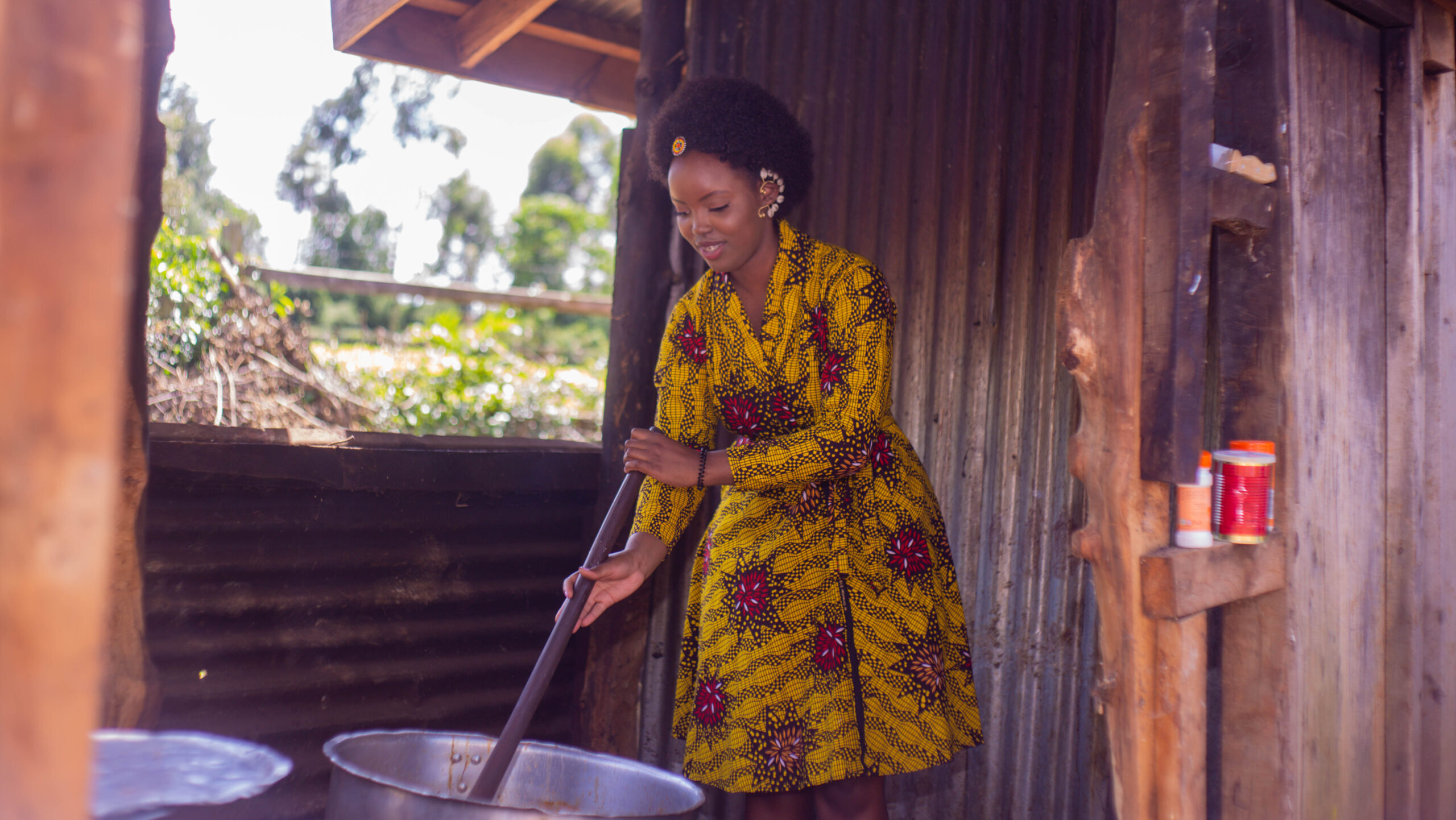Cherop Soy: Advocating for a Young and Gender-balanced Clean Cooking Sector
 Cherop Soy is the SDG7 Global Youth Ambassador at Sustainable Energy for All (SEforALL), where she calls for affordable, reliable, sustainable, and modern energy for all, and works to increase awareness for SDG7 among youth and those who are not familiar with the energy sector. She also runs the EcoWarrior Kenya blog, which presents an embodiment of her journey navigating the energy sector space and is available for early career professionals to have a glimpse of what this profession looks like.
Cherop Soy is the SDG7 Global Youth Ambassador at Sustainable Energy for All (SEforALL), where she calls for affordable, reliable, sustainable, and modern energy for all, and works to increase awareness for SDG7 among youth and those who are not familiar with the energy sector. She also runs the EcoWarrior Kenya blog, which presents an embodiment of her journey navigating the energy sector space and is available for early career professionals to have a glimpse of what this profession looks like.
The Clean Cooking Alliance (CCA) spoke with Soy about her experience as a young energy enthusiast and advocate for an inclusive clean cooking sector.
This story is part of a series featuring youth leaders from across the clean cooking sector.
Clean Cooking Alliance (CCA): Tell us about your current role and how it relates to uplifting the voices of young leaders in the energy sector.
Cherop Soy (Soy): My current role as SEforALL’s SDG7 Youth Ambassador is entirely about advocating for Sustainable Development Goal 7 (SDG7) from all angles, including uplifting youth voices. This ranges from enabling youth to understand the shifts and upcoming trends in the SDG7 field and where they can align themselves to strategically fill any gaps.
As the Gender Focal Point at the SDG7 Youth Constituency, we have been working closely with our youth members and close partners to build and advance the capacity of young women in the energy sector, as well as youth working to mainstream gender in the energy sector. One of our most recent highlights has been a partnership to place 750 women and 800 young people in clean energy jobs across sub-Saharan Africa by mid-2025. I am hopeful that this is the start of a positive collaboration that will expand beyond Africa in the next 5 years.
CCA: What motivated you to engage in clean cooking?
Soy: It is 2023 and cooking over an open flame is still a reality for many; including my own community. My motivation to make positive changes and progression in clean cooking comes from being part of the statistic that lacks access to clean cooking technologies.
From a professional standpoint, I have always been puzzled as to why clean cooking is not always an energy access priority for many countries despite millions of people lacking access to clean cooking technologies and many dying from associated health related complications. Moreover, I believe that almost all the Sustainable Development Goals are anchored on energy access, from health, education, and economic progress, to combating climate change. By far, clean cooking is a critical piece of the global CO2 emissions abatement puzzle that requires urgent action by all stakeholders.
CCA: What are critical spaces where youth in clean cooking and adjacent sectors need more representation?
Soy: Clean cooking is definitely a youth issue, not only because it negatively affects young people globally, but because there is a huge impactful business opportunity that youth can tap into. There are examples of youth thriving in the sector who are already in the business strand, such as the individuals spotlighted in previous Youth Leadership Series articles, including Mwayi Kampesi, Kakembo Galabuzi Brian, Ben Odongo, and Granny Lesiamang.
Following my participation in CCA’s Clean Cooking Forum 2022 as a youth delegate, I expressed my views on the myths and misinterpretations surrounding the clean cooking sector in a blog I named “What Clean Cooking Isn’t.” My sentiments stemmed from an observation that clean cooking is often tossed to the side when energy priorities are listed, whereas it must be fully embedded into these goals and targets.
Youth in clean cooking and adjacent sectors need more representation in research and policymaking spaces. Of the 54 countries in Africa, very few have clean cooking policies and strategies. This proves that this nascent sector has an opportunity for interested young individuals to drive the research on market analytics to influence policy engagement and business development.

CCA: How can the clean cooking sector encourage an inclusive and supportive environment for young leaders as critical agents of change?
Soy: An inclusive and supportive environment for young leaders to serve as critical agents of change starts with a collaborative approach with young people serving as collaborators, co-creators, and stakeholders within the industry. Young people are the primary demographic in Africa and will continue to be in the coming decades. The involvement of youth in the multi-stakeholder, intergenerational dialogues, and decision-making process is vital as youth are a crucial component in the equation. Youth are the upcoming energy and industry leaders, if not already. As young people, we will flip the narrative on clean cooking barriers, but only if we are empowered, educated, and mentored to do so.
Back in 2021, my peers and I from the SDG7 Youth Constituency collaboratively contributed to a White Paper on Meaningful Youth Engagement in the Intergovernmental Energy Space. This white paper was meant to serve as a guide to underline exactly what meaningful youth engagement means and how to mainstream it across the board.
CCA: What training opportunities are necessary for empowering youth to engage in the clean cooking sector meaningfully?
Soy: Within the clean cooking sector, the training opportunities that I find necessary for the empowerment and meaningful engagement of youth are mentorship, proposal writing, and pitching. With mentorship, youth in clean cooking can gain professional guidance from those that have advanced in their respective fields. Mentorship also allows for the expansion of networks, which is an essential trait within this sector. Proposal writing is an important skill that cuts across the clean cooking sector, and great proposals can move the needle from advocacy to a project’s implementation. Pitching is crucial to gain access to funds, the market, and both public and private stakeholders, especially since a great pitch can lead to buy-in from the target audience.
CCA: How have the various programs you are a part of benefited you professionally, and were they inclusive?
Soy: My interaction and participation with Student Energy has been profound in progressing my career in the energy sector. I started off as a fellow exploring the importance of an enabling environment for private sector investments towards improved energy systems for sustainable agricultural value chains and clean cooking. This fellowship led to my participation at CCA’s Clean Cooking Forum, which granted me access to partners and individuals I normally would not have had access to and provided an opportunity to share my perspectives with them. A key outcome from the conference, summed up in Student Energy’s blog, underpinned the value of two-way mentorship where leaders tap into the value that youth bring to the table.
My involvement as a delegate at CCA’s Clean Cooking Forum was inclusive as youth were represented from multiple disciplines, from across the world and from both francophone and anglophone African regions. I witnessed intergeneration and gender balance in almost all panels, which is surprisingly not easy to find in similar settings.
CCA: What needs to be done to better understand young people’s needs, challenges, and aspirations in clean cooking?
Soy: Plain and simple: sit with us and talk to us. We will tell you exactly what we need, how we need it, and when. As young people, we know where the hiccups lie, and we are ready and energized to be part of the solutions. Therefore, we need more platforms for us to showcase our recommendations and call-to-action.
CCA: How do you envision the role of youth in shaping the future of the clean cooking sector in the next decade?
Soy: In the coming decade, I envision young people occupying their rightful spaces in unlocking finances and rolling out a thriving pipeline of viable projects to deliver clean cooking technologies to communities lacking them. I also envision young people working together with other clean cooking stakeholders to drive more clean cooking policies and implementation strategies to bridge the access gap to a negligible figure, or better yet, to zero.
